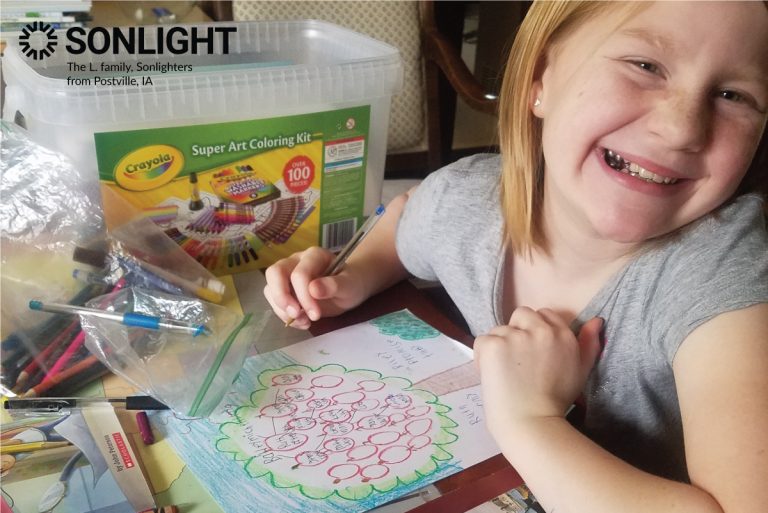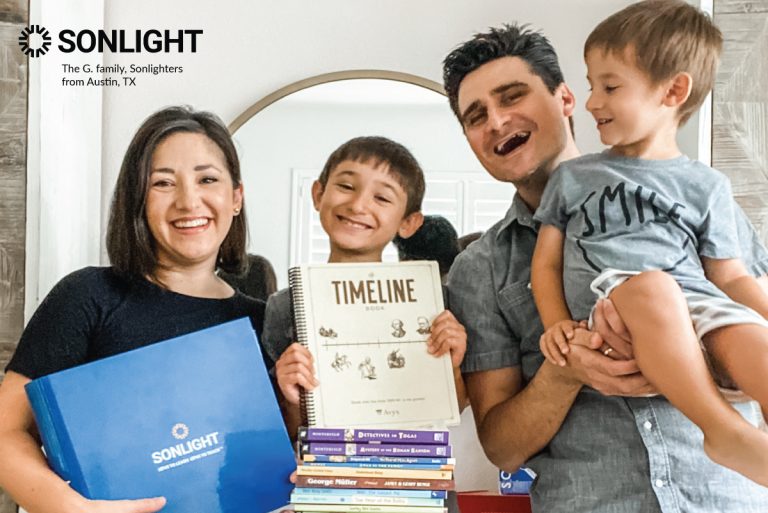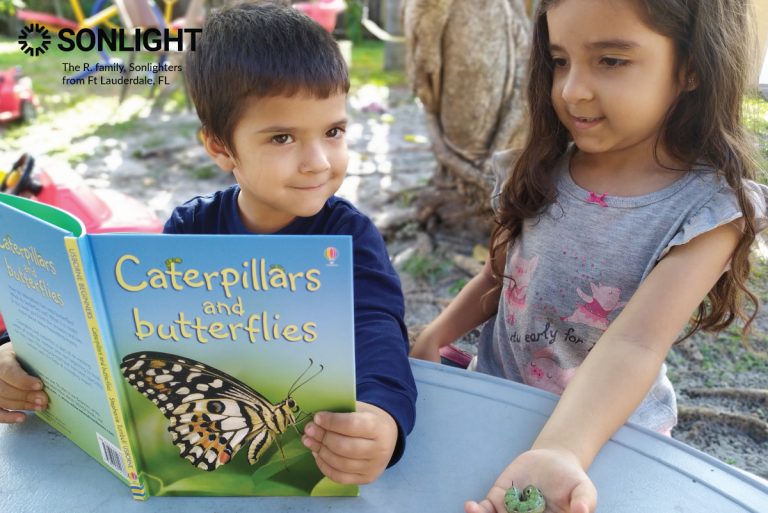
Are you thinking of making the switch to homeschooling, or looking for some best practices to bolster your existing homeschool routine? Whether you’re looking for homeschool tips for beginners, tips for successful homeschooling during COVID-19, or tips for homeschooling as working parents, this collection of tried-and-true tricks can help anyone have a great homeschool year. We’ll answer common questions and share our best advice for successful homeschooling.
How Many Hours a Day Do You Homeschool?
Sonlight reports it typically takes about 2 to 4 hours of formal instruction for a kindergartener to complete daily work. A sixth grader will spend 4 to 6 hours while a twelfth grader will spend 6 to 8 hours.
The important thing to remember is homeschool doesn’t have to mirror typical classroom learning.
Charlotte Mason, a historic British educator beloved by many homeschool families, is often quoted as saying, “Education is an atmosphere, a discipline, a life.” In other words, remember the first part of the word homeschool is home. Your children will be in your home all day, in many cases. There are nearly endless opportunities for learning.
Learning at home also doesn’t need to mean searing your eyeballs in front of a computer screen for the length of a traditional school day. Many homeschool families find they can complete homeschool work in a fraction of the time of a traditional school day—and with enjoyable resources like great books.
How long exactly depends on the curriculum, a student’s age, and family preferences. Teaching a high school student, for example, will obviously take longer than homeschooling a kindergartener. But in general, a homeschool day is shorter than a public school day.
Homeschool Tips During COVID
During the 2020-2021 school year the percent of homeschooling households in America more than tripled, up to nearly 20 percent, making the practice far from uncommon. If you find yourself homeschooling unexpectedly thanks to school closures or have chosen to homeschool because of the COVID-19 pandemic, remember these three key tips:
- Prioritize connection over curriculum. Whether you’re choosing to learn at home or feel pressured into the decision, homeschooling is a terrific opportunity to build a relationship with your child. No math worksheet will ever be more important than that.
- Take it slow, especially at first. If you plan to homeschool all year, allow your kids a brief period of deschooling for you all to get used to this new normal. Some families also start with one or two subjects and slowly add in others.
- Go at your own pace. Want to know a classroom teacher's secret? They never finish the entire textbook in a year! So you don’t have to either! Set your own pace.

What Is a Good Homeschool Schedule?
A good homeschool schedule is the one that works best for you and your family. Your schedule can outline what times during the day, which days of the week, and when during the year you have homeschool lessons. As a homeschool family, your options are almost endless, as long as you meet any state requirements.
Scheduling Homeschool Days
Making the switch from a structured school classroom to learning at home can seem overwhelming. The good news is you don’t have to replicate a classroom at home or ring a bell between classes (although you could). But keeping to a routine, even a loose one, is helpful for most families.
Many families follow this kind of daily routine, studying the same subjects at about the same time each day.
- Start with morning time, a chance for the family to learn together, with read-alouds, poetry, Bible reading, and music. This time works well with Sonlight History / Bible / Literature selections.
- Later morning hours cover Table Subjects™ like math and language arts where students work independently at their own academic levels.
- Read-alouds are a natural fit during lunch, afternoon snack break, or tea time.
- Many families finish schoolwork by lunch, leaving the afternoon for other activities. Shorter homeschool days leave more time for family activities, field trips, extracurriculars, special interests, or free time.
Scheduling the Homeschool Year
Similarly, homeschool families may choose a school calendar that works best for them: a traditional schedule, learning year-round, or any variation in between.
Above all, flexibility is key because one of the nicest aspects of homeschooling is the ability to chase rabbit trails when a student is particularly interested in a topic. Take more time as needed on a difficult subject rather than racing through to the finish.
Sonlight Instructor’s Guides make scheduling simple, no matter how you choose to schedule your homeschool. Subjects are color-coded and broken down into suggested activities for a 180-day school year. Many parents simply check off a box as they complete each item. Here is a walk-through of how to use the Instructor’s Guide.
Didn’t complete all the items on the day they were prescribed? No problem at all. The Instructor’s Guide is just that–a guide, meant to work for you. Each family makes it their own.
Homeschool Tips and Tricks: Tips for a Great Homeschool Year
So how do you combine your curriculum and your schedule into something that actually works for your kids day to day? What are the practical nitty-gritty secrets that get you through an entire school year while nurturing a zest for learning?
Best Practices for Homeschooling
Although there are about a dozen different homeschool styles and each family is unique, there are some overarching principles that nearly every family follows. Here are those universal, best practices for homeschooling:
1. Be Clear About Your Motivations
One of the best homeschool tips is to have a solid reason why you’re choosing to homeschool. Write it down, journal it, or post it on your fridge—whatever works best to keep it front and center.
While you may choose to homeschool to escape something fearful, a more inspiring and long-lasting perspective that will carry you through the rough days of homeschooling is to have a positive aim in mind.
To help you crystalize your homeschool motivations and goals and get them on paper, use this free Refuel Your Homeschool printable.
And be sure to revise your motivations periodically. While some core reasons will never change, you may find your homeschool priorities morph over time. Some families find that the reason they began homeschooling is not why they keep going.
2. Find Homeschool Community
Feeling alone is a terrible burden. So don’t let yourself get there! Find the support that ministers to your heart and cling to it.
- For some moms, community means that one bestie who is always on tap to debrief a bad day or provide a voice of sanity when you’re second-guessing yourself.
- For other moms, the vibrance of an in-person group with regular meeting times is what fills their cup.
Whether you’re in the bestie camp or the weekly moms-group camp, all of us can find bonus community support via virtual networking. For example, the (zero fee) Sonlight app offers a no-drama, no-advertising platform for connecting with other parents who know exactly what you’re going through.
3. Choose Your Curriculum Carefully
Your biggest homeschool expense will be your curriculum. And generally, it’s something you use for the full school year. So making the wrong choice can be painful not only to your budget but also to your morale if you hate it!
- Opt for a program with a proven track record and a money-back guarantee.
- Read The Sonlight Decision to see if Sonlight is a good fit for your family.
- If you’re homeschooling more than one child, consider a curriculum that lets you combine them in certain subjects. This will help you to save time and money!
- Weigh both the immediate and long-term value in the curriculum you’re buying.
- Talk to a representative from the companies you’re considering before swiping that card. They can help you avoid costly mistakes.
4. Keep Family First
Whatever curriculum you choose, whether you’re a homeschool veteran or just starting out, the best tip is to enjoy the time spent with your kids. Every day won’t be perfect. But the memories you’ll make together will be priceless.
While you’re agonizing over which math curriculum to choose and wondering if your child is getting behind in reading, remember that the most important part of your job as a homeschool mom or dad lies in your relationship with your child. Homeschool lessons will end one day! But your relationship with your child will be a lifelong source of joy and blessing. So always keep the main thing the main thing.
Academics, extracurriculars, and organization are all important. But the family bond of love is the heart of it all. Whenever faced with a homeschool decision, the family bond takes precedence over any other consideration.
Tips for the First-Year Homeschooler
About 9-12 weeks into your first year homeschooling you’re probably thinking,
“Oh my goodness...what have we done?”
You are knee-deep in overwhelm, right? Let me reassure you….
This feeling is 100% normal.
If I can be very honest, eight years into this homeschooling gig, that feeling is still occasionally normal for me.
Let’s face it. We have chosen to take our children’s education into our hands. Hands that sometimes don’t feel qualified. It can be daunting.
But nothing is more daunting than that feeling the very first year. I still remember ours. I had decided to piece together the curriculum for my first grader. I can’t decide if I was totally naïve, or just overly ambitious... probably a mix of both, really.
I remember being about a fourth of the way through the school year, thinking, “Oh my...this is way harder than I thought! Maybe we made a huge mistake!”
If I could go back in time and reassure my first-year self, here’s what I’d say…
1. Survive Your First Year
I’m forever convinced that people who choose Sonlight right out of the gate are at a huge advantage, but I’m sure that even those moms and dads have that moment of panic when the big box arrives. Here’s what you need to know about the first year: You just need to survive it.
You and your child are learning so much this first year. Just get through it. Don’t worry about having things set up just so. Don’t worry about checking every box. Just finish the year.
2. Set the Tone
This first year will set the tone for your homeschooling adventure. This year, you need to focus on the fundamentals of homeschooling, and I actually don’t mean reading, writing, and arithmetic! I mean relationships, expectations, and procedures.
Relationships
Focus on your personal relationships with your children.
- Value connection over academics.
- Enjoy your children as often as you can.
- Study them to know their likes and dislikes.
I always like to challenge myself with this: If someone were to ask me to describe my child, could I do a thorough job? Strive to deeply know and enjoy your children.
Expectations
This is the year you will begin to establish expectations. Don’t stress too much. Your expectations will change as your children grow older, but you’ll need to get a good start this year.
First, establish expectations in the home. Since your children are home rather than at school all day, they will be able to help with the housework. What are your expectations there? Keep in mind that a huge part of life is learning how to deal with housework, so time spent on chores is not wasted.
Next, consider your schoolwork expectations. Do you expect them to work mostly independently or will you be available during certain hours? What happens if they dawdle? Will you let it slide, or will there be a consequence?
Year number one is the best year to instill your expectations. Now, don’t despair. If you are well past your rookie year, it’s certainly not too late. It’s just much easier to set expectations in that first year before bad habits set in.
Procedures
Many public schools spend the first week of school establishing procedures for the classroom. While homeschoolers generally don’t have to devote so much time to logistics, it is important to establish procedures in the first year.
You’ll want to make sure that your child knows where to gather supplies, where they should do their work, and how supplies should be cleaned up after tasks. Teaching these simple procedures early in your homeschool journey will save a surprising amount of time in the long term.
3. Celebrate
You and your family are doing a big thing! It should be celebrated! That first year is a prime time to learn to enjoy each other. Homeschooling families spend a lot of time together, so families need regular times to blow off steam and relax together.
Find big things to celebrate. Find little things to celebrate!
- You made it through your first week? Yay! You should take everyone out for a park play-day!
- You completed your first biology dissection with limited gagging? Way to go guys! You should go grab a snow-cone!
- Your kiddo finished their very first Sonlight reader? Wow! That deserves an outdoor picnic I think!
Your first year holds the potential for thousands of small and big celebrations. Take advantage. Those are good memories you’re making!
In a nutshell, your rookie year is all about learning and growing together. Focus on the big things this year instead of the little things. Think about the big picture. Remember why you’re doing this, and keep your eyes on that single goal. You’re going to have your moments, but everyone has moments. You can do this!

Christian Homeschool Tips
If you’re homeschooling as a Christian, you have an added motivation. By educating at home, you can provide your child an environment which nurtures their faith in Jesus. You can speak freely about the Bible and your beliefs and interject those truths into every subject you learn together.
1. Find Your Faith-based Goals for Homeschooling
There are plenty of secular reasons to homeschool: a superior education that’s tailored to each child, flexible scheduling, and room for student-led exploration. But when you tap into your Christian faith as inspiration for homeschooling, you find a deeper motivation!
See if any of Sonlight’s top goals are the same as your own. Feel free to borrow from our goals as you craft your own homeschool mission statement!
As Christians, our goals for education go beyond raising productive citizens who have successful careers. We truly aim to prepare our children for whatever God has in store for them. This is a high and worthy calling!
2. Educate Not Indoctrinate
A Christian homeschool education does not have to mean indoctrination or brainwashing. Quite the contrary! You can impart Christian principles and study the Bible while also teaching your children to understand and respectfully engage with opposing views.
Be sure to provide multiple perspectives as part of your teaching. This may be as simple as a discussion to see both sides of an event from history. Or it could involve actually reading books that tell the same story through different lenses.
3. Shelter Your Children In (But Not From) the World
Luke Holzman, son of Sonlight founder Sarita Holzmann describes his Christian childhood:
“My sheltered childhood was like a day at the beach: sun, shells, bikinis, beach balls, and all. The sheltering I had was a shaded awning, like something made from bamboo and dried palm fronds. The sea-breeze could flow in with the sights and sounds of life. I could go out and come back. I had a safe place to be, protected from rain and cold. I was not tossed alone into the world. I was sheltered, covered, protected . . . and free.
Sure, I got sand in my shorts. The air occasionally was fishy. Sometimes I got sunburned.
But despite this mild discomfort, my parents let me dig moats, fly kites, talk to people, explore, run, play, discover.
The world was open to me, and I was encouraged to interact with it and, in doing so, to exhibit God's love and grace to any and all whom I met along the way.
Life does not disrupt the kind of sheltering I had. Because as we read our Bibles and various biographies and learn together, we encounter complex characters and situations. We learn about life. Like anyone, we can be disheartened and disillusioned. But we're not huddled in a house, hoping nothing gets in. We are standing on the shore, looking out.
Sheltered.”
It’s a beautiful picture of the kind of sheltering we want to provide our children: a sheltering that gives them tools to engage kindly with the world, not one that causes them to wall themselves away from society in an angry huddle.
3. Teach Them to Think and Let Them Wrestle
As you teach your child to think critically, you may find them disagreeing with you from time to time. Take this as a sign of success not failure! Wrestling is key to owning your own faith.
In Why Christian Kids Leave the Faith, Tom Bisset explains a key reason kids abandon Christianity: “They left because they never personally owned their faith.”
A personal testimony is something kids have to strive to attain. They have to ask hard questions and come to their own answers. Spoon feeding them the right answers is not enough to anchor them to faith. Expose them to big ideas and have discussions about them.
Maintain a humble sense of wonder and curiosity so you can learn alongside your child. While we base our lives on the bedrock truth of the gospel, there remain many mysteries we cannot fully comprehend. Embrace this uncertainty and let your child see how your own understanding is constantly developing and how it deepens, not diminishes, your belief.
Tips for Homeschooling Kindergarten
Starting off as a homeschooler with a kindergartener? You are in for a treat! You will always look back fondly on this year with your five-year-old as you remember the books you read and the crafts you did.
Before you read the basic tips for homeschooling kindergarten below, take a deep breath. You absolutely can do this—yes, even teaching your child to read. It’s really not that hard to teach a child how to read, and there are so many great curriculum options to guide you step by step.
Leave your anxiety behind and embrace the delight of teaching your child. Remember, your mood sets the tone!
1. Build a Predictable Routine
To prepare your child for homeschooling, establish a daily routine. This predictable rhythm will give your child a sense of safety and will smooth the transitions from activity to activity.
This routine does not have to be clock-based at all! It’s simply a sequential flow of your day, for example from breakfast to reading time to playtime to lunchtime to nap time, and so on. Of course, some days will be exceptions to the rule, but setting up this comfortable pattern will make formal schooling easier to ease into.
2. Ease into Formal Schooling
Having a fully planned kindergarten curriculum will give you peace of mind and eliminate the time-consuming task of lesson planning. So, yes, get a solid kindergarten curriculum! But hold it loosely, always taking cues from your child.
The biggest mistake an eager young homeschool mom makes is to push too hard too soon. So take your time! If your child is resistant or frustrated, put it aside and try again in a few months. Or lay out all the goodies from your curriculum and let your child choose what to work on.
Don’t expect your child to sit still while you read aloud. It’s okay for them to color, build, or otherwise play quietly as you read. As long as they can answer the discussion questions from your Instructor’s Guide at the end of the assigned passage, they are absorbing what they should!
School doesn’t take long at this stage—just 1-2 hours a day is plenty! So don’t force your child to sit at a table for hours on end with pencil in hand. Make sure your kindergarten is age-appropriate with lots of hands-on exploration and listening to great books.
3. Nurture Curiosity and a Love of Learning
Above all, make it your goal to nurture your child’s natural curiosity and ignite a love of learning. Working through the curriculum is far less important than accomplishing these two.
Welcome rabbit trails and “What if …” questions, letting them take over your day if your child is excited about them! Let your child know that the goal of each school day is learning and that learning is so fun!
Shun busy work that typically bores and tires young children. Instead, fill their minds with great stories and then discuss them! Yes, it’s really this simple.
High School Homeschool Tips
Your goal for the high school years is not just graduation but raising a self-sufficient adult! Here are the three ingredients you need: independent learning, accountability, and autonomy.
1. Ease into Independent Learning
Just as you ease into formal schooling for a kindergartener, you need to ease into independent learning for a high schooler. By all means, don’t go straight from parent-led instruction to totally independent work. A gradual increase in solo work is the best path to take.
You’ll probably begin this process in middle school (or even 5th grade for some more motivated learners), giving them the reins to work one or two of their daily assignments alone. At first, it may be just a few reading passages or math activities done solo. As time goes on though, a teen can do more and more without your direct supervision. Check out our steps for teaching independent learners at different ages.
2. Provide Accountability
Even the most responsible of teens can get behind if they don’t have predictable check-ins to monitor their progress. So be sure to give your teens the support they need even if they seem to bristle against it.
3. Give Autonomy
Without autonomy, teens become listless and anxious. In fact, autonomy is the primary contributor to life satisfaction. Talk with your teen about their academic and life goals. Listen to what they say, and as much as possible, make room for their concerns and preferences.
Make sure they have ownership in homeschool curriculum decisions and extracurricular pursuits. Be the facilitator of their goals, knowing that high school is the first step towards higher education and/or a career. Read here to learn more about homeschool graduation requirements.
Homeschooling Tips for Working Parents
Can you work and homeschool? Absolutely! A large proportion of homeschool parents have a part-time job or side gig and manage to successfully educate their kids at home. And some parents who work from home are able to juggle full-time jobs!
1. Flex Your Schedule
Release yourself from the 7:45 am to 3:15 pm school day box. Look at all the waking hours of your week as potential homeschool hours. Don’t forget evenings and weekends. Here are just a few flexible scheduling ideas to get your wheels turning:
- Save all of your science for Saturday mornings. Do the full week in one fell swoop.
- Instead of watching television in the evenings, have your spouse read the read-alouds to the entire family while you’re doing meal prep for the next day or catching up on work emails.
- Opt for a 4-day curriculum that makes your load lighter.
- Schedule your 5-day curriculum into a 4-day schedule.
- Spread your weekly lesson plans over a 6-day school week where you do less each day.
- Use work holidays or vacation days to double up on homeschooling when there are no work distractions.
- Continue homeschooling year-round instead of taking a long summer break.
- Use time on the road for audiobooks, independent reading time, discussing Read-Alouds, practicing math facts, going over vocabulary workbooks, etc.
2. Become a Time Management Pro
Since time is what the working homeschool parent typically feels most limited by, time management lies at the crux of any tips for working parents.
We already know that a homeschooling schedule is incredibly malleable. But depending on the flexibility and variability of your work demands, you may prefer rigid time blocking or a looser routine.
There are tricks to squeezing more teachable moments from the margins of your day, but avoid multitasking as it depletes your energy and negatively impacts the quality of both tasks.
One way to get more homeschool value from your time is to overlap subjects. For example, with a literature-based curriculum, your children learn history and language arts at the same time with the same program. Topics like vocabulary and geography come up organically and don’t require a separate curriculum. This holistic approach to education means that you streamline your day and teach in a much more connected way that actually makes the material stick.
Another pro tip for time management is to rely on an open-and-go, fully planned curriculum. Lesson planning, reserving books from the library, and researching activities are incredibly time consuming. Use tools that save you time instead of squandering your precious hours reinventing the wheel.
3. Adjust Your Expectations
As a working homeschool parent, you will have to choose your battles. You may have to release the desire for
- An always tidy and sanitized home
- Three homemade meals each day
- Matching socks and perfectly fixed hair
It’s okay to opt for takeout or use frozen shortcuts for mealtimes. And your home is just going to be messier since you’re there all day! As far as personal appearance, you may decide that pajamas are an acceptable work and school from home uniform!
Come up with a minimum viable homeschool day and commit to getting at least that much done daily. But let the extras go—guilt-free—on the days when you’ve got a pressing work deadline or there are errands to run. Your minimum viable homeschool day may be as little as reading, spelling, and math. But set that bar ahead of time so you don’t feel like a failure when you ditch science and the Timeline book for a week.
4. Invest in Child Training and Processes
While you’re adjusting those expectations, realize that you aren’t the be-all-end-all. Your children can help!
Could you train your children on how to load the dishwasher or how to clean the bathrooms? Would a weekly chore chart divide the labor and keep everyone accountable? Yes, it takes time to teach kids how to do these tasks (and follow up when they slack). But in the long run, you gain considerable benefits of time savings and a tidier home! Your children master practical life skills and get to contribute to the working of the family. It’s a win-win.
Would a defined process for meal planning, prep, and cleanup improve efficiency, lower your own stress, and ensure that the family isn’t resorting to frozen burritos three nights a week? If yes, take the time to put it in place.
When we run through each day in a crisis mode, it feels impossible to make changes like these. So think about your next day off when there is no school or work. Call it infrastructure day! And invest in setting up routines that get your kids involved in making the home run more smoothly.

Do Homeschoolers Get a Better Education?
As a homeschool parent, you’re bound to have days of doubt.
- Am I giving my kids enough?
- Are my children behind their peers?
- Am I being too easy or too hard on them?
But be assured that yes, you are giving your kids the best education they can get. Because you love your children more than anyone else could, you are the most motivated person on the planet to give them a high-quality education.
Ask most homeschoolers and they would agree, their education is better than one they would receive elsewhere, for a few main reasons.
- First, homeschooling is individualized education. Parents can tailor curriculum to a student’s learning style, pace, and interests. They can choose curriculum based on what’s important to their family, whether that’s a Christian background, a focus on the classics, instilling a love of literature (or all three!).
- Homeschooling also offers the smallest possible class size, greater focus, a shorter and likely more effective school day, and less time dealing with transitions and classroom mechanics. Young children, with shorter attention spans, can get up and move when they need to, not according to an arbitrary classroom schedule. Older children can get the rest they so often need, perhaps sleeping later and starting their school day mid- or late-morning instead of sometimes before the sun is even up.
- With more time and greater flexibility, students can also pursue what interests them. Homeschooling creates lifeline learners—an ultimate goal for many parents.
What Are the Disadvantages of Being Homeschooled?
People unfamiliar with learning at home may have questions, and sometimes misinformed opinions, about homeschool life. In reality, the disadvantages of homeschooling are few and far between and fairly simple to resolve.
Academic Add-ons and Extracurriculars
While a public school may have the resources for elaborate classroom setups, complete libraries, computer and science labs, gyms, bands, and art rooms, a homeschooler has more modest means to provide this kind of tangible enrichment.
If your child feels a loss in this area, talk about what they are wanting more of and find creative ways to supply it for them. With programming at local museums and zoos and a homeschool co-op, most of these supposedly lost perks can be replaced or even improved upon!
The Stereotypical Trappings of School
Some kids may long for a school locker, eating with friends in the cafeteria, playing sports on big teams, performing in the marching band, attending the homecoming parade, or going to prom. As a homeschooler, their school experience will mostly be devoid of these traditional aspects of public school (especially high school).
But there are alternatives! Some public schools include homeschoolers in sports or band. And many homeschool groups hold their own dances and field trips. You can even buy your homeschooler a class ring or create a homeschool yearbook!
Loneliness
Don’t let the myth of the unsocialized homeschooler become a reality for your child! If you’re a homebody introvert who is homeschooling an extroverted social butterfly, it will take special attention to make sure your child isn’t lonely or isolated. Again, this is not impossible to overcome; it simply takes a concerted effort. Keep the lines of communication open with your child so you can modulate their need for more (or less) social time with peers.
Disadvantages for Parents Who Homeschool
From the parent’s perspective, there are sacrifices you’ll make as a homeschooler. These aren’t necessarily disadvantages as much as realities that you’ll need to account for as you make the choice to homeschool.
1. Time Commitment
Homeschooling requires a deep commitment from parents. While using a curriculum like Sonlight makes it simple, investing time in your child’s education is a journey that requires work but reaps rich rewards. It’s not as easy as dropping your children off at a public school and simply inquiring about homework each day. Homeschooling is the time and energy commitment of at least a part-time job.
2. Isolation
Being a stay-at-home parent can feel isolating at times. But with the proliferation of homeschool co-ops, civic groups, online networks, and other organizations, there are a myriad of ways to find your community. Make self-care a priority, and be sure to have hobbies and friends that are outside of your homeschool bubble so that your entire identity is not wrapped up in solely being a homeschool parent.
3. Responsibility
Although parenting is a huge responsibility itself, when you take on your children’s education, there’s another layer of gravity. While it’s essential to take this role seriously, it’s counterproductive to feel paralyzed by fear of making mistakes. When responsibility becomes a painful burden, it’s time to call in reinforcements—maybe ask for help from your spouse or friend, maybe see a therapist, or possibly talk to a Sonlight Advisor.
Are Homeschoolers More Successful?
No form of education can guarantee a particular outcome for a student. But homeschooling does offer the opportunity to develop into more self-directed, creative learners than students might otherwise be. An educational career spent in thoughtful discussions over quality literature and with ample time for extracurricular pursuits is bound to create a very particular kind of student.
For evidence-based research about the success of homeschoolers, see the National Home Education Research Institute (NHERI). Here are two key articles that demonstrate the efficacy of homeschooling:
- Homeschool SAT Scores for 2014 Higher Than National Average
- Academic Achievement and Demographic Traits of Homeschool Students: A Nationwide Study
Famous homeschoolers throughout history range from presidents, artists, and authors to athletes, actors, and inventors. For more everyday stories, read through Sonlight’s Where Are They Now? series to see where Sonlight Scholarship winners and long-time Sonlight students ended up as young adults.

Do Colleges Care If You Were Homeschooled?
Yes, colleges care. But not in the way you may assume. Most colleges welcome homeschoolers rather than shun them! Being homeschooled is an asset, not a drawback when it comes to college admissions.
So don’t let the idea of college scare you away from homeschooling through the high school years. Remember Charlotte Mason and her idea that education is “an atmosphere, a discipline, a life?” That holds true for colleges, too. Getting into college and succeeding there isn’t merely about a grade point average or a stellar application essay. Most colleges are looking for students who want to learn:
- Who have strong study skills
- Who know how to research
- Who can effectively write
- Who actively engage inside (and outside) the classroom
- Who aren’t afraid to ask good questions
These are qualities most homeschool students have mastered by high school graduation.
Homeschool students understand the value of self-driven, efficient education. These are qualities employers value, too. A study from the Homeschool Legal Defense Association showed that more than 74 percent of home-educated adults ages 18-24 had taken college-level courses, compared to 46 percent of the general US population. It also showed they are more likely to be involved in their communities and engaged citizens, and that they are glad they were homeschooled.
Are Homeschoolers Socially Awkward?
A common myth about homeschool families is that their children are poorly socialized. Homeschoolers, in general, are actually more socially adept than their public or private school peers.
Consider that a typical homeschooler might spend an average week bouncing between co-op classes, extracurricular activities, church meetings, field trips, and outings with friends or family. Now consider the wide age range (birth to elderly) a student is likely to regularly interact with at these events. It’s much broader than a typical grade-level classroom, giving homeschoolers a genuine breadth of experience that boosts their emotional quotient.
Instead of being influenced mainly by the narrow confines of a grade-level peer group, children are influenced at home and by other avenues parents choose. Far from being socially awkward, homeschool parents often receive compliments on how skilled children are at navigating social situations with people of all ages.
In short, no, homeschoolers aren’t socially awkward due to being homeschooled.
How Expensive Is Homeschooling?
There are many factors to consider when figuring the cost of homeschooling. But the average homeschool family spends between around $700 to $1,800 per year. While it is possible to spend less, keep in mind the value of the materials you’re using.
A complete homeschool curriculum package is an open-and-go option that makes it simple to homeschool (a great option for working parents to consider). You might spend less money than the average if you opt for DIY unit studies, but spend more time tracking down materials and putting together a schedule. Or you may spend more money than the average if you enroll your child in an online homeschool program which costs thousands of dollars per year, per child.
Sonlight is a literature-based curriculum, which means that multiple students of different grade levels can share books. In future years, you can upgrade and re-use the curriculum with siblings as they grow. This evergreen nature of Sonlight makes it an incredibly affordable curriculum option.
How Much Should I Pay Someone to Homeschool My Child?
You’re not alone in your homeschool journey. Help is available if you need it. Check your state regulations, but chances are you can pay someone to assist in schooling your children—whether that’s a math tutor, extra help a few mornings a week, or simply music lessons. Parents of children with special needs should consider that therapy as school, too. Everyone from speech to occupational therapists can be part of your teaching team.
How much you might pay outside help will vary based on expertise, experience, and their specific function in your child’s academic life. Tutoring costs may range from $25 to $80 per hour, depending on several factors. You may pay more for private horseback riding lessons than you would for a county soccer league, but both are great options for physical activity. Other options to share teaching responsibilities may be joining a homeschool co-op or other learning group where the labor is divided among parents.
Do Parents Get Paid for Homeschooling?
While you cannot get paid for homeschooling your own child, you can get paid while homeschooling, whether by tutoring a student from outside your family (if your state allows it), by working a part-time job, or by freelancing. Some parents even work full-time while homeschooling.
A few states offer families the chance to apply for benefits on taxes or stipends if they meet certain criteria, but this is not common.
So in general, no, parents are not paid monetarily to homeschool. But that’s not to say that homeschooling is without rewards! There are so many intangible and priceless benefits to homeschooling that very few families regret the investment into their children. In fact, most parents are sad that they didn’t start sooner!
Parents commonly cite these invaluable perks of homeschooling: less anxiety and stress (compared to attending school), closer family bonds, the ability to tailor an education for the child, and flexibility in scheduling and pacing. So while you won’t get a paycheck for homeschooling, you will certainly be blessed by the results it brings!

















